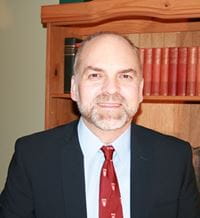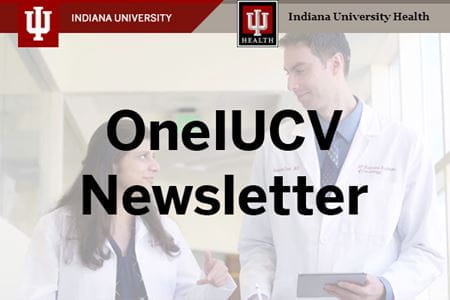We wish you and yours good health and happiness in this Holiday Season and in the New Year.
Welcome to our Team

Gabriel Gruionu, PhD joined IU School of Medicine, Division of Cardiology as an Assistant Research Professor and Director of Cardiovascular IP Development in October 2020. He earned his MS Degree in Biomedical Sciences from the University of Missouri-Columbia, a Ph.D. Degree in Biomedical Engineering from the University of Arizona and performed post-doctoral studies in the Departments of Surgery at IU School of Medicine and Radiation Oncology at Harvard Medical School. He has extensive R&D experience as a product specialist in the medical product industry at W.L. Gore & Associates, Inc. where he supported several medical products commercialized worldwide. Currently, Dr. Gruionu is developing a computer-assisted surgical navigation and medical robotics platform while also developing a new innovation program in the Division.
 Onyedika Ilonze, MD joined the IU School of Medicine as an Assistant Professor of Clinical Medicine in the Division of Cardiology in September 2020. After residency, he trained at Wake Forest University for one year of advanced heart failure and transplant cardiology. He then proceeded to a cardiology fellowship at Virginia Tech Carilion Clinic program and then had another year of advanced heart failure and transplant cardiology with a particular focus on all aspects of pulmonary hypertension and heart failure with preserved ejection fraction. His primary clinical responsibility is in Heart Failure and Transplant Cardiology at IUH-Methodist Hospital.
Onyedika Ilonze, MD joined the IU School of Medicine as an Assistant Professor of Clinical Medicine in the Division of Cardiology in September 2020. After residency, he trained at Wake Forest University for one year of advanced heart failure and transplant cardiology. He then proceeded to a cardiology fellowship at Virginia Tech Carilion Clinic program and then had another year of advanced heart failure and transplant cardiology with a particular focus on all aspects of pulmonary hypertension and heart failure with preserved ejection fraction. His primary clinical responsibility is in Heart Failure and Transplant Cardiology at IUH-Methodist Hospital.
 Hassan Mostafa, MD is a General Cardiologist who joined Community Medicine Cardiology in July 2020 after completing his cardiology fellowship at IU School of Medicine. His main practicing location is at Saxony with outreach locations at MMP East and Tipton. Dr. Mostafa will be with Community Medicine for one year until he leaves to complete his interventional and structural fellowships in Minnesota in July 2021.
Hassan Mostafa, MD is a General Cardiologist who joined Community Medicine Cardiology in July 2020 after completing his cardiology fellowship at IU School of Medicine. His main practicing location is at Saxony with outreach locations at MMP East and Tipton. Dr. Mostafa will be with Community Medicine for one year until he leaves to complete his interventional and structural fellowships in Minnesota in July 2021.
 Hugo Rios-Meza, MD is an Interventional Cardiologist who joined Community Medicine Cardiology in July 2020 after completing his cardiology fellowship and interventional fellowship at IU School of Medicine in 2019. Dr. Rios-Meza's main location is at Saxony with an outreach location at the Primary Care Hazel Dell clinic.
Hugo Rios-Meza, MD is an Interventional Cardiologist who joined Community Medicine Cardiology in July 2020 after completing his cardiology fellowship and interventional fellowship at IU School of Medicine in 2019. Dr. Rios-Meza's main location is at Saxony with an outreach location at the Primary Care Hazel Dell clinic.
 Alexander (Olexandr) Smolensky, MD joined the IU School of Medicine, Division of Cardiology as an Assistant Professor of Clinical Medicine in November 2020. Dr. Smolensky's primary clinical responsibility is in general Cardiology at the IU Health Adult Academic Health Center, while also participating in the IU Health Sports Cardiology Program. His research focus is on vascular disease.
Alexander (Olexandr) Smolensky, MD joined the IU School of Medicine, Division of Cardiology as an Assistant Professor of Clinical Medicine in November 2020. Dr. Smolensky's primary clinical responsibility is in general Cardiology at the IU Health Adult Academic Health Center, while also participating in the IU Health Sports Cardiology Program. His research focus is on vascular disease.
Fellowship Match Results
We are excited to welcome a new group of physicians to our fellowship training program!
Our new fellows starting July 2021:
(Name, MED School, Residency/Fellowship)
Cardiovascular Disease:
- Courtland Blunt, University of Louisville, University of Tennessee
- Patrick Fitzgerald, Southern Illinois University, Mayo Clinic
- Mark Kauth, Oakland University William Beaumont, Indiana University
- Eric Kellett, University of Toledo, The Ohio State University
- Cody McCoy, University of Tennessee, University of Texas Southwestern
Electrophysiology:
- Mansour Almnajam, Jordan University, University of Connecticut
- Eric Robinson, Indiana University, Indiana University
- Siddharth Shah, Krishna Institute of Medical Sciences, University Medical University
Heart Failure:
- Bhavana Siddegowda Bangalore, Kempegowda Institute of Medical Sciences
Vascular Surgery:
- Neal Ramchandani, Indiana University, Indiana University
KUDOS
Honors and Recognitions
Georges Ephrem, MD, MSc, was selected for the American College of Cardiology's Clinical Trials Research: Upping Your Game Program. This program is intended to ensure diversity of thought, experience, and perspective and ensure that the evidence base includes data more closely reflecting the demographics of actual cardiovascular patients. As such, as we end up performing more successful research from our institution thanks to its educational impact, we will have Hoosiers better represented in the studied patient population and therefore, the results would be more applicable to them and more likely to impact their CV health positively.
November 12th was Genetic Counselor National Awareness Day, where we recognized Katie Spoonamore, MS, LCGC. Katie is part of the growing team of CV Genetic Counselors with IUSM/IUHP. She is housed in the Division of Cardiology where she sees patients with a personal or family history of inherited CV disease, and also has research and education related roles. Genetic counseling in cardiology helps families adapt to genetic implications of their disease, and it helps cardiologists extend care beyond the initial patient to the entire family - with the ultimate goal of preventing morbidity and mortality due to cardiovascular disease. Cardiovascular genetic counseling has most commonly been focused on diagnoses with known monogenic causes (genetic arrhythmias, cardiomyopathies, lipidemias, etc.). We continue to grow our programs and care for these families, while also looking forward to the future of using genetic information to help predict risk for cardiovascular disease, heart attacks, and strokes in the general population.
Andrea Price, MS, CPHQ, RCIS, AACC, Director of Quality Databases at IU Health, has been selected to serve as a Chair-Elect of the Cardiovascular Team Section Leadership Council through the American College of Cardiology. Andrea's term will begin April 1, 2021, and extend for 1 year.
Awards
Thomas Everett, PhD, was recently awarded an NIH SPARC grant. He and his co-PIs will be investigating the mechanism of vagal nerve activity on mediating the symptoms of nausea and vomiting, and if gastric electrical stimulation also affects heart rate and cardiac function.
Andrew Gonzalez, MD JD MPH, was recently funded by an AHRQ/PCORI K12 Learning Health Systems mentored career development award administered through an IUSM/Regenstrief partnership. Under this grant, Dr. Gonzalez will use an artificial intelligence and computer vision algorithms to develop a platform combining clinical imaging and EMR data to gain a better understanding of limb salvage trajectories for patients with peripheral arterial disease.
Publications
Sudden cardiac death (SCD) results from atherosclerosis in the great majority of cases. Whether carotid intima-media thickness (C-IMT), a known marker of subclinical atherosclerosis, is associated with risk of SCD in a general population remains unknown. Takeki Suzuki, MD, PhD, found that in two biracial community-based cohorts (ARIC and CHS), that abnormal C-IMT was associated with SCD. These results from diverse populations behoove studies treating subclinical atherosclerosis to prevent SCD. Learn more in Dr. Suzuki's paper published in the Journal of the American Heart Association.
Individuals with sickle cell disease, a condition that disproportionately affects black lives, suffer premature death that can be sudden. It has been uncertain to date if these sudden death could be a result of fatal ventricular tachycardia (VT) or sickle cell cardiomyopathy (SCC). Research recently published in the high impact journal, Blood, by Ankit Desai, MD, and his team of Indiana University's School of Medicine's Krannert Institute of Cardiology has discovered evidence for both in a mouse model of sickle cell disease. They further demonstrate an inflammatory basis for both VT and SCC in interleukin-18 (IL-18), as well-known inflammatory cytokine with genetic relevance in patients. His research included testing of a drug called IL-18 bp that inhibits IL-18, finding that it attenuated both VT and SCC in the sickle cell disease mouse model. Moving from mouse to humans, the team found that blood levels of IL-18 may be a novel biomarker for SCC and VT in patients with sickle cell disease. This study directly addresses a critical health disparity in the high risk and largely under-served population with sickle cell disease, and identifies a potential treatment pathway for patients at risk for sudden death.
Check out more publications in recent months from across OneIUCV
Vascular Surgery
Cardiac Surgery
In the Media
Woman, 25, experiences heart failure after COVID-19 infection. Read on about the important efforts that highlight the impact our OneIUCV Team can make on people's lives.
BioCrossroads honors the 'Father of Echocardiography'. Read how Harvey Feigenbaum, MD, was awarded the 2020 August M. Watanabe Life Sciences Champion of the Year Award.
Man raises money for family heart scans after losing son to heart attack. Watch this great story on Noel Dasgupta's, MD, patient.
Specialists to gravely ill congenital heart patient: your heart's in the right place. Watch how Team OneIUCV took on this case and performed a successful life saving surgery.
SGLT2 Inhibitors
Check out these two new Cerner auto text phrases - .SGCV and .SGHF - from Nathan Lambert, MD, as you consider use of SGLT2 inhibitors to favorably impact cardiometabolic health:
.SGHF:
Consider use of SGLT2 inhibitors as adjunctive therapy for patients with type 2 diabetes to reduce the risk of HF hospitalizations
The following drugs have shown to reduce the outcome of HF hospitalizations in patients with diabetes (reduced HF hospitalizations appears to be as class effect, and appears to be independent of underlying CVD):
- Empagliflozin (Jardiance)
- Canagliflozin (Invokana)
- Dapagliflozin (Farxiga)
Citations:
SGLT2 inhibitors for primary and secondary prevention of cardiovascular and renal outcomes in type 2 diabetes: a systematic review and meta-analysis of cardiovascular outcome trials.
Lancet.2019; 393 (10166):31. Epub 2018 Nov 10.
.SGCV:
Consider the following SGLT inhibitors as adjunctive therapy for DM in patients with established CVD.
Trials have shown a reduction in the composite endpoint of CV death, nonfatal MI and nonfatal stroke, in patients with DM and known CVD already on standard therapy.
- Empagliflozin (Jardiance)
- Canagliflozin (Ivokana)
Citations:
Empagliflozin, Cardiovascular Outcomes, and Mortality in Type 2 Diabetes. EMPA-REG OUTCOME Investigators
N Engl J Med. 2015; 373(22):2117. Epub 2015 Sep 17.
Canagliflozin and Cardiovascular and Renal Events in Type 2 Diabetes.
CANVAS Program Collaborative Group
N. Engl J Med. 2017; 377(7):644. Epub 2017 Jun 12.
IUPUI Paws' Pantry Holiday Giving

Do you want to give back this holiday season?
We are still collecting food and hygiene products and making donations to Paws' Pantry through January 8.
Ways in which you can contribute to Paws' Pantry:
- Don't have time to shop or can't bring in goods due to teleworking? Click this online donation option and choose the Paws' Pantry Support Fund
- Place donations in the orange Paws' Pantry bin in the KIC mailroom/breakroom E371 or in the Campus Center:
Campus Center and Student Experience, Paws' Pantry
420 University Boulevard, Suite 370
Indianapolis, IN 46202
List of Donations Accepted
